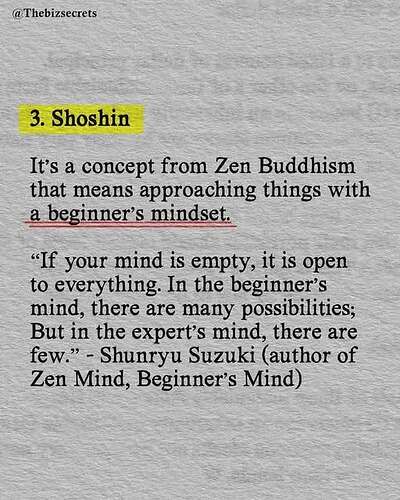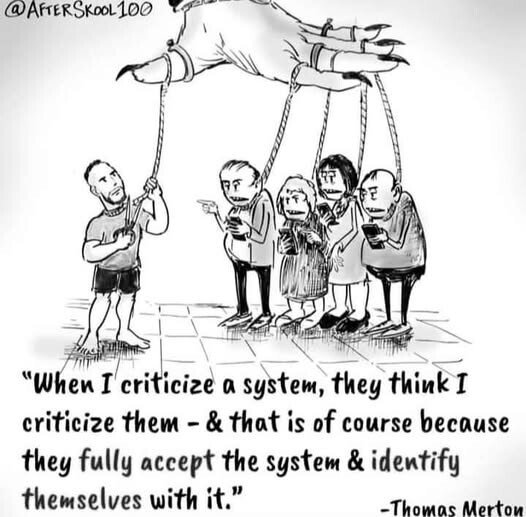There’s a problem with quotes here, but here goes:
Rather: Says the observant citizen who, since emigrating, realised how much in the dark he was and went looking. It took a decade for me to catch up with schooling, reading, and writing to various people that I met through penfriend sites. My learning curve started to rise exponentially, with the direction influenced by becoming a nurse, but continually spreading. I’m still learning, as we all are. Curiously, my wife told me that this morning, some expert on a TV program prognosed a future very similar to what I have said.
Reading the whole thing does help.
Until now, I haven’t ‘lumped’ anyone together, although I’ve regarded American politics for some time and ‘smoke and mirrors’. Trump’s intention has been clear for some time, with his praise of Putin and Kim, and initial enthusiasm for Xi Jinping, which cooled considerably. So, he’s not so much the ‘wild card’ that he’s been made out to be. He’s also following some pretty stereo-typed policies. In his book “Mein Kampf,” published in 1925, Hitler spoke, among other things, of his “living space (Lebensraum) policy in the East.” He built on the existing ideas about the East as a new settlement area, which you could also frame as being “important for our economy.”
When Trump didn’t rule out economic or military force, he was also saying that America’s priorities are above the priorities of other nations, which transliterates Hitler’s idea that the German people were “master race.” Churchill spouted some similar garbage, albeit being white supremacist in his case.
I don’t disagree that the media are complicit in recent political developments, and the whitewashing of policies as though it was what everybody wanted. My penfriends in California, Dallas and Tallahassee also expressed their doubts and concerns which led me to believe that some of the ‘rogue’ journalists I followed had a better understanding on the ground. John Pilger, for example, said, “I always look for the truth from the ground up, rarely from the top down. Journalists are never real journalists if they are agents of power, no matter how they disguise that role. Real journalists are agents of the people.”
I’m afraid your condescension rolls off me like water off a duck’s back. The fact is that empire has always disturbed the peace and called retaliation ‘terrorism’ or some other term. It was always the conquered who were the ‘savages’. I gave you examples of native Canadians visiting France in the 17th century and telling them that the French were the real savages after seeing the poverty in Paris. Your ill-informed allusion to ‘Kumbaya’ forgets that it is an African American spiritual known to have been sung in the Gullah culture of the islands off South Carolina and Georgia, with links to enslaved Central Africans.
In fact, you agree with me that the ‘arrangement’ is anything but good, and you would rather be ‘conquered’ by America, although it would mean an end to many things that make Canada exceptional. They are the same things that have bothered American politicians about Europe, including our parliamentary systems, and the fact that all ministers are elected representatives, not some billionaire who wants to play at politics. Health care and the many other benefits that are available to our citizens. I would rather not be conquered at all by a tyrannical oligarchy.
Now you are betting on both horses, and on the one hand you criticise my statement, but on the other hand you say, “perhaps its what we deserve.” Besides, I think that, if Trump and Putin have their way, it would mean the collapse of our economy, and the de-industrialisation of Europe and, consequently, a dependency on (probably) Russia’s policies.
I felt an inherent sense of injustice when I heard how my parents and their friends regarded the indigenous people I mixed with on the beach as a child. It wasn’t meant to be racist, but it was, because they had been brought up in Britain of the postwar period. Later, as the people came from former colonies, my mother encouraged my friendship with my Jamaican school buddy, and experiencing the resentment they felt when I visited him and his brothers in their home taught me a lot. Later, he visited me in Germany when he was in the army and told me that the racism was still a problem.
Of course, my experience began as anecdotal, but with the help of the library and later the internet, there are many sources to be found. Even between the lines of Churchill’s memoirs and those of others like him, you can find evidence of the accusations made against the colonists. I accept the fact that “they didn’t know any better”. But it doesn’t let us off the hook if we are still in a state of denial, and our right-wing media churns out its biased reports. There is a pattern, for example in Musk’s intervention in Britain, where the ‘grooming gangs’ have been a problem since at least the 1970s and are mixed race, not predominantly Muslim. Musk and the media don’t want to look at the whole scenario and help the victims by implementing the measure advised by the report, they want to review one particular case involving immigrants.
The more attention we pay, the better our chance are at getting to the truth. The ‘brainwashed’ are those who have stopped paying attention and follow instructions.
I am an idealist in this respect and know that my senses can be deceived and that what I see is, as it were, a *re-*presentation of reality, not how reality actually presents itself. I am aware that my perception is an interpretation of what my senses give me, often assuming the bias I have until I can discern whether I am actually seeing what I assume. I try to approach experiences with a ‘beginner’s mind’ and avoid my assumptions, which helped me greatly in nursing. In this regard, I was always the sceptic until I had reason to believe otherwise.
Exactly, which is why the pragmatist in medicine, for example, does what they can, given what they know, because there is often no time to speculate further. In nursing, especially in long-term care, we begin with a biography as best we can gather, and sometimes it is given by the children, who have their own perspective. This means that we ask those affected in whatever way possible, whether they share that perspective. Either way, these are perspectives, and another family member may have a different perspective. We therefore lay down no single perspective as ‘the truth’ and validate each perspective for what it is.
Hearsay is every report that is not personally experienced. Therefore, it may or may not be ‘true to life’ as far as the perspectives of those affected are concerned. This can only be ascertained by enquiry, and the result is still not ‘the truth’ but at best ‘in line with lived experience.’
Knowledge isn’t so much a myth as the memory of information given to me. How factual this information is, relies on whether I or someone I trust have checked with other sources. The truth content is then ‘in line with lived experiences’ or not. Knowledge doesn’t have the validity of a mathematical equation but is reliant upon confirmation.
I prefer the ‘flying by instruments’ metaphor that Bernardo Kastrup uses. Our senses are like the instruments of a plane that help pilots fly blind in bad weather. We have to learn to read them properly to safely land the plane. The truth content of the instruments is something that experience confirms by managing to land. The more often we do it, the better we get at it. It is the same in life, our trial-and-error approach is either validated, or our efforts show their inadequacy. This is especially true for those who become street-wise, and learn to cope with an aggressive environment.
What I have heard and experienced are perspectives of a larger reality. I am aware of that, but like I said above, when you make a point landing over and over again, you begin to trust your reading of the dials. There is always the chance that the instruments need to be recalibrated, which we shouldn’t neglect, which in my case means keeping in contact with people and reading the latest assessment of current and past affairs.
In this paragraph you start to talk down to me, which I feel is inappropriate. I have said above that information that I have not experienced is hearsay, and we don’t know each other well enough to ascertain whether we can trust each other. Therefore, I accept your judgement and in the case that you disagree, assume that you do not have enough experience to confirm my related stories.
I’m not sure what you are saying here. It is more a case of whether I have enough experience to say I believe someone, or whether I remain neutral towards a statement. Usually, on a forum, it isn’t lifechanging, so we can just let it go, or say, “Oh, that was interesting.” We might say, “I haven’t heard that perspective before, thank you!” It isn’t a question of ascertaining ‘the truth.’
During his 2024 presidential campaign, Donald Trump did publicly distance himself from Project 2025, stating he was not involved with the plan. Despite this, several individuals associated with Project 2025 have been nominated for key positions in the incoming administration, including Russ Vought for the Office of Management and Budget. This suggests that while Trump has disavowed direct involvement with Project 2025, elements of its policy recommendations may still influence his administration.
One historical case involving the killing of a UN envoy is a notable and complex incident rooted in the early stages of the Israeli-Palestinian conflict and the formation of the State of Israel. Responsibility was claimed by Lehi, whose leaders included figures like Yitzhak Shamir (later Prime Minister of Israel). Count Folke Bernadotte was a Swedish diplomat and the UN mediator for Palestine in 1948. He was tasked with negotiating a peaceful resolution to the conflict between Jewish and Arab forces during the partition of Palestine and the establishment of Israel.
Bernadotte proposed plans for resolving the conflict, including recommendations that were perceived as unfavourable by Zionist groups, such as international control over Jerusalem and allowing Palestinian refugees to return to their homes. Bernadotte was assassinated in Jerusalem by members of the Lehi (Lohamei Herut Yisrael, also known as the Stern Gang), a Zionist paramilitary organization. The killing was carried out by Lehi operatives, who saw Bernadotte’s proposals as a threat to the nascent State of Israel’s sovereignty and territorial aspirations.
There are more examples. Individuals like Rachel Corrie, an American activist opposing the demolition of Palestinian homes, died under disputed circumstances when crushed by an Israeli bulldozer in 2003. This is often cited as an example of the dangers faced by those opposing Israeli policies.
The problem with Western nations is that it is in their DNA to have a somewhat elitist attitude, something that Putin mentioned, as have various leaders around the world. The supposed moral high ground that the West told its citizens was the difference between Western nations and those like Russia and China or other nations with whom we have had disputes, has turned out to be a lie. We have been covertly conspiring, manipulating and overturning elected governments as much as anyone. The problem is that there are still lots of people who believe the propaganda.
At least with Trump, he doesn’t hide it, but that is little consolation if the tyrannical oligarchy becomes a reality for every nation of the world.
“Falscher Brief”. Der Spiegel (in German). 1970-09-27. ISSN 2195-1349. Retrieved 2024-04-13.
Heller, Joseph (1995). The Stern Gang: Ideology, Politics and Terror 1940–1949. Frank Cass. ISBN 978-0-7146-4106-5.

